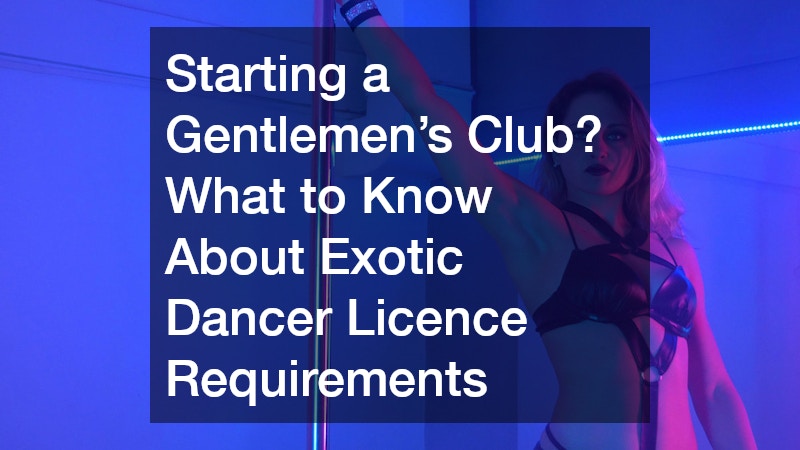Starting a gentlemen’s club in Australia isn’t as simple as leasing a space and hiring performers. It involves complying with local laws, state regulations and council guidelines—especially when it comes to securing an exotic dancer licence. Whether you’re new to the adult entertainment sector or expanding an existing nightlife venture, understanding licence requirements is essential to avoid legal trouble and protect your investment.
Before you open your doors, you’ll need to learn how your business fits into the broader category of adult entertainment venues. Unlike standard hospitality operations, clubs that feature exotic dancers are governed by additional rules related to zoning, performer registration, venue operation and signage. Local councils often treat these venues differently from more conventional spaces like bars or hairdressers, meaning it’s not a one-size-fits-all process.
This article walks you through three core aspects: navigating licence rules, comparing venue permits and complying with signage laws. Along the way, you’ll see how an exotic dancer permit affects your setup, operations and marketing. By following each step carefully, you’ll be better equipped to start your club legally—and keep it running smoothly.
Navigate Licence Rules

Getting a handle on licensing requirements is the first step in establishing a legally compliant venue. In Australia, businesses in the adult entertainment industry must meet both state-level and council-level conditions before operating. These rules typically cover zoning restrictions, noise limits, security standards and restrictions on trading hours. Because regulations vary depending on your location, it’s vital to contact your local council and state licensing authority to confirm exactly what’s needed. Failure to secure an exotic dancer certificate could lead to fines or forced closure—so it’s not something to leave until the last minute.
Specifically, your club will likely need to apply for a special-use permit and register under a licensing system designed for adult venues. In some cases, you may need to undergo background checks, show proof of business viability or adhere to performer safety guidelines. State governments may also have registers of licensed adult entertainment providers. If your venue plans to serve alcohol, additional liquor licensing will apply. All these layers form the foundation for securing an exotic entertainer licence, which is crucial to legally employing performers and marketing your venue.
Compare Venue Permits

Not all businesses face the same scrutiny when applying for operating permits. For instance, opening a salon or working as a mobile hairdresser involves far fewer regulatory steps than launching a gentlemen’s club. That’s because adult venues are classified differently under most planning schemes. Local councils assess these applications with a greater focus on community impact, proximity to schools or residential zones and public interest concerns.
To move forward, you’ll need to understand how your venue is categorised compared to standard service-based businesses like hairdressers or massage clinics. Some councils require public notification or even a hearing before granting permission for an adult entertainment business. Your venue’s layout, proposed hours of operation and overall footprint can all affect the approval timeline. If you’re re-purposing a space—like converting an old retail shopfront—you may also need to lodge a development application. The process of obtaining an exotic dancer licence won’t proceed smoothly unless your base venue is approved first.
Follow Signage Laws

Your venue’s visual presentation must comply with strict signage regulations that often apply to adult businesses. Councils typically limit the size, wording and placement of signs for gentlemen’s clubs to minimise visibility to the general public, especially in areas near family services or schools. Unlike cafés or gyms, your business may be prohibited from using neon lights, provocative images or explicit text on external signs. These limits aim to balance commercial freedom with public decency.
To stay within legal boundaries, research your local council’s signage codes. In some cases, you’ll need to apply for separate signage permits, especially if you’re planning illuminated or large-scale displays. Consider investing in subtle branding or private entranceways to align with compliance requirements. Having an exotic performer licence doesn’t mean you’re free to advertise however you like. Ignoring signage rules could not only lead to penalties but also attract negative attention from enforcement officers and the community. Thoughtful signage planning shows regulators—and patrons—that you’re operating with professionalism.
Starting a gentlemen’s club in Australia involves far more than choosing a name and securing a location. You’ll need to navigate adult entertainment licence rules, compare venue permits that differ from standard businesses like hairdressers and comply with local signage regulations. Each step plays a role in obtaining an exotic dancer licence, which is essential for running a legal and sustainable operation. By doing your research and following all council and state requirements, you can build a reputable club with long-term success in mind.

